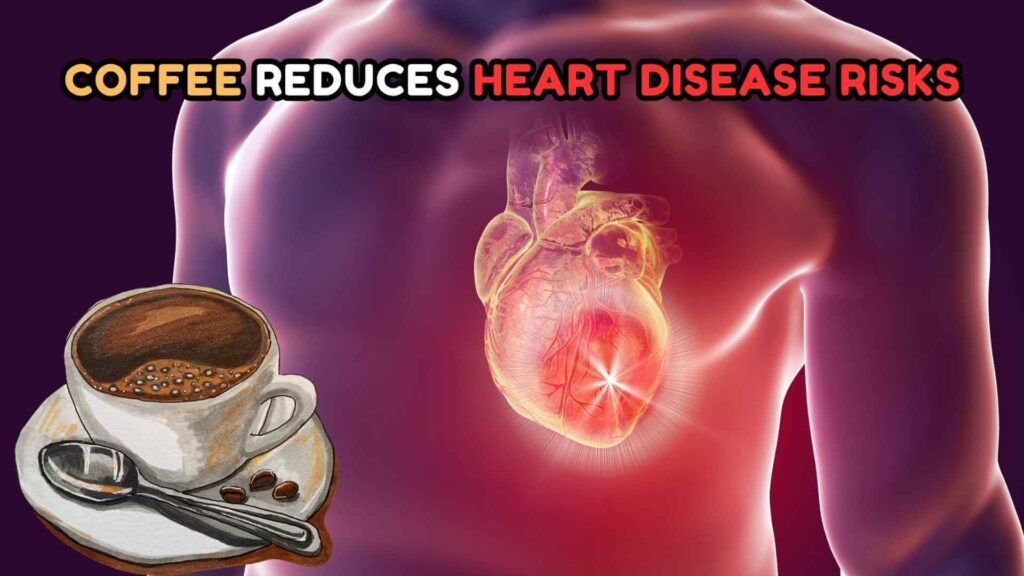Coffee is more than just a morning pick-me-up; it’s a beverage enjoyed by millions across the United States, often paired with moments of relaxation or social gatherings. Beyond its rich aroma and taste, coffee has been the subject of numerous studies exploring its potential health benefits.
One area of particular interest is its relationship with heart health. Can drinking coffee actually reduce the risks of heart disease?
Let’s delve into the research to uncover the truth.
You may like buying: Best Coffee Makers in the USA

Understanding Heart Disease and Its Risk Factors
Before examining coffee’s role, it’s essential to understand what heart disease entails and the factors that contribute to its development.
What Is Heart Disease?
Heart disease, or cardiovascular disease (CVD), encompasses a range of conditions affecting the heart and blood vessels. These include coronary artery disease, heart failure, arrhythmias, and stroke. Heart disease is the leading cause of death in the United States, with millions of individuals living with varying degrees of heart-related conditions. Understanding the risk factors associated with heart disease is key to both prevention and treatment.
Modifiable Risk Factors
These are lifestyle-related factors that can be controlled or improved through changes in behavior:
- High Blood Pressure (Hypertension): Elevated pressure in the arteries can damage the heart and blood vessels, increasing the risk of heart disease.
- High Cholesterol Levels: Excessive cholesterol can lead to plaque buildup in the arteries, obstructing blood flow and increasing the risk of cardiovascular events.
- Smoking: Tobacco use damages blood vessels, reduces oxygen in the blood, and contributes to the development of heart disease.
- Physical Inactivity: A sedentary lifestyle is linked to weight gain, poor circulation, and added stress on the heart.
- Unhealthy Diet: Diets high in saturated fats, salt, and sugar can lead to obesity and contribute to heart disease risk.
- Excessive Alcohol Consumption: High alcohol intake can lead to high blood pressure, arrhythmias, and heart failure.
Non-Modifiable Risk Factors
These are genetic or age-related factors that cannot be changed:
- Age: The risk of heart disease increases as we age, with individuals over 65 being more susceptible.
- Family History: Genetics play a role in heart disease susceptibility. If a close family member has had heart disease, it may increase your risk.
- Gender: Men generally have a higher risk of heart disease at a younger age, but the risk for women increases significantly after menopause.
- Ethnicity: Certain ethnic groups, such as African Americans, have a higher risk of heart disease due to a combination of genetic and environmental factors.
Coffee and Heart Disease: The Research

The idea that coffee can reduce the risk of heart disease may seem surprising to some, given that it’s commonly associated with raising blood pressure temporarily. However, research suggests that moderate coffee consumption may have protective effects on heart health.
The Protective Effects of Coffee
Moderate coffee consumption has been associated with a reduced risk of heart disease. A meta-analysis of prospective cohort studies found that individuals who consumed 3 to 5 cups of coffee daily had a significantly lower risk of cardiovascular disease and related mortality compared to non-drinkers.
Coffee’s Impact on Heart Disease Risk
| Coffee Consumption | Relative Risk of Heart Disease |
|---|---|
| 0 cups (non-drinkers) | Baseline risk |
| 1-2 cups | 10% reduced risk |
| 3-5 cups | 15% reduced risk |
| > 5 cups | 5% increased risk (in some studies) |
The evidence suggests that coffee drinkers tend to have a lower risk of heart disease, although excessive consumption (more than 5 cups daily) may increase the risk in some cases, particularly for individuals sensitive to caffeine.
Key Components in Coffee Beneficial for Heart Health
Several compounds in coffee contribute to its cardiovascular benefits:
Antioxidants
Coffee is rich in antioxidants, particularly polyphenols like chlorogenic acid, which help reduce oxidative stress and inflammation. These are key factors in the development of heart disease. Research has shown that antioxidants in coffee can help reduce the damage caused by free radicals in the body, which otherwise lead to plaque buildup and arterial damage.
Caffeine
While caffeine can temporarily raise blood pressure, studies suggest that regular coffee drinkers may develop a tolerance to caffeine’s hypertensive effects over time. In fact, moderate caffeine consumption may not significantly affect long-term blood pressure levels.
Diterpenes (Cafestol and Kahweol)
These compounds, found in unfiltered coffee, have anti-inflammatory properties that may help reduce the risk of cardiovascular disease. Research has suggested that cafestol and kahweol can help lower bad cholesterol (LDL) levels in the body, improving overall cardiovascular health.
Optimal Coffee Consumption for Heart Health

Research indicates that moderate coffee intake—typically 2 to 3 cups per day—is associated with the greatest cardiovascular benefits. Excessive consumption, particularly over 5 cups daily, may negate these benefits and could be linked to increased heart disease risk.
| Coffee Consumption | Health Impact |
|---|---|
| 1-2 cups daily | Lower risk of cardiovascular disease |
| 3-5 cups daily | Strongest protective effect on heart health |
| More than 5 cups daily | Increased risk, especially for those sensitive to caffeine |
Moderation is key. Drinking coffee in moderation may lower the risk of heart disease, but excessive consumption might have the opposite effect.
Timing Matters: Morning Coffee vs. All-Day Consumption
Emerging studies suggest that the timing of coffee consumption may influence its impact on heart health. Drinking coffee in the morning, rather than throughout the day, may be more beneficial. A study published in the European Heart Journal found that morning coffee drinkers had a 31% lower risk of dying from cardiovascular disease compared to those who consumed coffee later in the day.
Morning Coffee and Cardiovascular Health
The idea behind this finding is that coffee consumed in the morning is less likely to disrupt the body’s natural circadian rhythm and has more pronounced benefits in reducing inflammation and oxidative stress. On the other hand, consuming coffee later in the day might interfere with sleep patterns, leading to increased stress and potential long-term heart risks.
Potential Risks and Considerations

While moderate coffee consumption can be heart-healthy, it’s important to be aware of potential risks:
High Blood Pressure
Individuals with uncontrolled hypertension should consult healthcare providers before increasing coffee intake. While moderate coffee consumption has not been shown to have long-term effects on blood pressure, people with high blood pressure should still be cautious.
Pregnancy
Excessive caffeine during pregnancy can lead to complications, such as low birth weight, preterm delivery, and developmental issues. Pregnant women should limit their coffee intake to 200 mg of caffeine per day, which is equivalent to about one 12-ounce cup of coffee.
Sleep Disturbances
Consuming coffee late in the day can interfere with sleep patterns, leading to insomnia or reduced sleep quality. As sleep plays a crucial role in heart health, it’s important to consume coffee early in the day to avoid disrupting rest.
Conclusion
Incorporating moderate amounts of coffee into your daily routine may offer protective benefits against heart disease, thanks to its rich content of antioxidants and other bioactive compounds. However, it’s essential to consume coffee mindfully—opt for black coffee or use minimal additives to avoid negating its health benefits. As with any dietary habit, balance and moderation are crucial.
Remember, coffee is just one component of a heart-healthy lifestyle. Regular physical activity, a balanced diet, and regular health check-ups are equally important in maintaining cardiovascular health.
In conclusion, drinking coffee in moderation—especially in the morning—can indeed reduce the risks of heart disease, but it should be viewed as part of a broader commitment to a healthy lifestyle. A balanced diet, exercise, and consistent medical care remain the cornerstones of cardiovascular health.
Sources and References:
Disclaimer:
This blog is for informational purposes only and is not medical advice. Please consult a healthcare professional before making any changes to your diet or lifestyle.



0 Comments